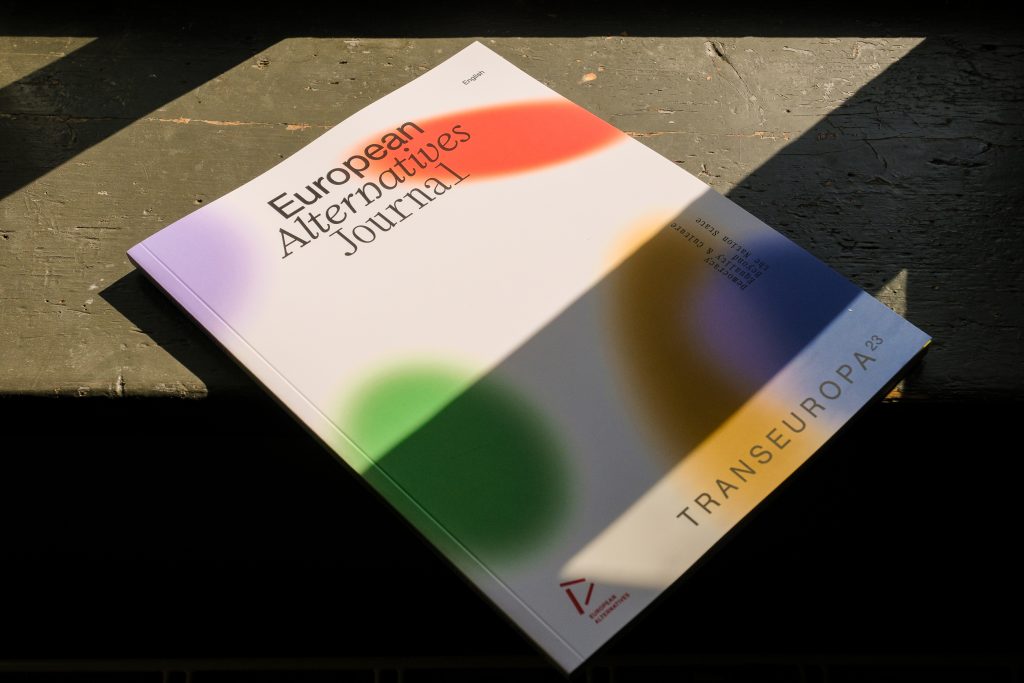Jan 23, 2025
CALL FOR ARTICLES – The Making of a Democratic Youth Future
Issue 9 European Alternatives Journal
“Ciascuno cresce solo se sognato” (One only grows if dreamt), wrote Danilo Dolci1, reminding us that the power to dream and imagine is not only a personal necessity but also a collective responsibility.
In a fragmented world marked by political polarization, environmental crises, and shifting social landscapes, young people stand at the crossroads of profound challenges and transformative possibilities. Young people do not want to be merely inheritors of a flawed system but active architects of change, demanding new forms of democracy and participation that reflect their realities and aspirations.They are leading grassroots movements, imagining bold new futures, and challenging systems that fail to tackle urgent issues like climate justice, social inequality, and digital rights.
Young people are less confined by borders, they are more politically aware, more connected through digital platforms, and more willing to take to the streets to demand transnational solidarity and change. Whether through large-scale protests, social media campaigns, or youth-led organizations, their activism is a powerful reminder that democracy must be more than just elections — it must be an ongoing conversation, one that is open to all voices and geographies, especially those that have historically been marginalized or excluded.
But too often, they are met with resistance: institutionalized politics often fails to reflect their interests or provide spaces for meaningful participation, their voices are ignored, their actions infantilized, and in some cases, violently suppressed. Further, state education systems increasingly lack political studies and critical thinking, and digital platforms are actively reducing their fact-checking capabilities.
For a future where anything is possible—a future where the unimaginable can become reality—we must embrace radical participation. This means democracy must evolve to not only listen to young people, but to give them the tools and the power to shape policies, legislate change, and transform the political landscape.
Inspired by Danilo Dolci’s poem, and Rob Hopkins From What Is to What If: Unleashing the Power of Imagination to Create the Future We Want, this issue of the EA journal places imagination and collective dreaming at the heart of a youth-led-democratic transformation. Asking “What if?” is more than a question – it’s a radical act of reimagining systems, relationships, and futures that reflect their values and aspirations. What if education empowered young changemakers with tools to act? What if democracy became radically inclusive, giving young people genuine power to shape policies and decisions? What if art and creativity fueled activism, fostering deeper connections to society’s challenges?
We seek pieces that explore the intersection of democracy, youth, participation, and education transnationally, that reflect on the evolving relationship between young people and democratic processes, new and alternative methodologies of education and participation, how young people are reclaiming their voices, and reshaping our political systems to be more inclusive, fair, and hopeful.
Connected to our Critical ChangeLab project — featured in Issue 8 with the article Everyday Democracy in Action: Towards Critical Change Through Youth Engagement by Jacc Griffiths — we emphasize the importance of moving from abstract rights to rights that are experienced, negotiated, and enacted in daily life.
How are young people in different countries navigating political participation, and how do they see their roles in shaping future democracies? How does youth engagement reflect broader concerns about trust in democratic institutions? How can imagination be the key to building the future we want? We invite you to imagine and reflect on the questions that matter most to the future of youth, democracy, and participation.
We welcome a range of perspectives, from scholarly analyses to personal stories, and from theoretical reflections to practical insights. At the heart of these reflections lies the recognition that democracy is not just a political system but a lived practice, one that unfolds in everyday spaces like schools, workplaces, and social movements.
Submission Guidelines
Read the guidelines here.
Contact our editors Marta Cillero Manzano m.cillero@euroalter.com and Noemi Pittalà n.pittala@euroalter.com if you’d like to contribute to the journal.
Deadline: 15 February 2025, 9AM CET
About the EA Journal
The EA journal is a space to imagine alternatives beyond the nation-state. It contains think-pieces, articles, artistic and cultural contributions, podcasts, videos and more on a broad range of topics and themes spanning democracy, culture, equality, decolonisation, social movement organising and more. In 2023, we relaunched the European Alternatives journal. First published in 2007, the journal has long been a space to map out visions, ideas and pathways for an alternative, open and radically more democratic Europe.
- Danilo Dolci (1924–1997) was a Sicilian educator, sociologist, and activist, often referred to as the “Gandhi of Sicily” for his commitment to nonviolence and social justice. Renowned for his innovative approaches to education and community engagement, Dolci dedicated his life to addressing poverty, inequality, and systemic injustice, particularly in southern Italy. Dolci’s initiatives and tools – as the maieutic dialogue – often focused on creating opportunities for youth to engage in civic life, challenging social norms, and fostering a sense of agency. ↩︎
